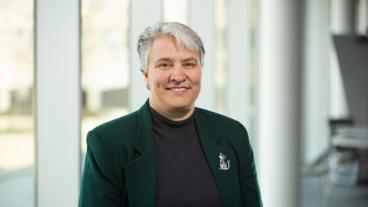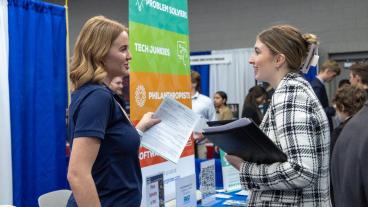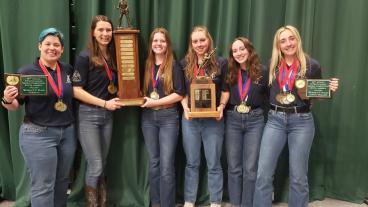Santiago Gonzalez, a graduate student in computer science, started his undergraduate degree at Mines in 2010 at the age of 12. He is currently teaching the Mines course, Operating Systems, and getting ready to defend his thesis in November. Gonzalez is set to finish his master’s degree in December 2015.
We asked Gonzalez about his experience at Mines, what it's like to teach a 400-level course and what he plans to do after he graduates.
Why did you choose Mines?
It’s more that Mines chose me. I got in contact with Electrical Engineering and Computer Science Professor Tracy Camp who is my advisor. She invited me to apply and come to Mines. Everything ended up working out really well.
Did anything surprise you about Mines after coming here?
I was super happy to be with a group of people that thought like me, very scientifically-minded and nerdy.
What’s your favorite spot on campus?
I’m not sure it’s as much a favorite spot as it is where I have to get my work done on campus, but the SINE (Sensing Imaging and Networking) lab in the Brown Building. It’s where I’m doing work for my thesis and getting it ready for my defense Nov. 16.
I spend about 30 hours a week there.
What else are you doing aside from defending your thesis and getting ready to graduate this December?
I’m taking a class this semester called Distributed Computing Systems with Electrical Engineering and Computer Science Associate Professor Qi Han.
I’m teaching CSCI-442 Operating Systems (OS), which is one of the computer science undergrad classes. That should keep me pretty busy.
Also, my advisor and I are thinking of publishing a paper from the results from my thesis.
What has been the best thing you’ve experienced at Mines?
I’ve really gotten an understanding of exactly how computers work and why they work the way they do. It’s not really just some magic box that does stuff when you type things in the keyboard. I think that’s one of the really cool things that has happened here.
What was your favorite project at Mines?
For my thesis, I had to develop some new geophysical sensing mote (hardware) for the SmartGeo research group.
Right now for Distributed Computing Systems, my partner and I are building a simulator to validate different computer systems in high radiation environments in space. We’re simulating a spacecraft around some body and all the different subsystems you would have like reaction wheels. We had an idea for how to make the spacecraft computer systems much more resistant to radiation without having to use any super fancy expensive hardware, just using redundancy with commercial systems. Probably a larger project than we should have chosen for that class, but it’s fun.
How did you choose that project?
The class is studying how to get a network of computers to accomplish some goal. So that goal could be storing data across a large number of computers so that it’s more reliable. Or in our case: spreading computation across several systems to make it more resistant to radiation. We were discussing a bunch of ideas and this evolved out of the discussion.
What has been one of the biggest challenges you’ve faced at Mines?
Physics I was so difficult. It’s a very demanding class. Conceptually, the material is pretty understandable. Physics I is basically mechanics—how things move given a system of things. If I have this book and I tilt it, how long will it take for something to slide down it? But then you start getting into the math and all of the work—it’s just a lot of work.
There’s definitely been tons of challenges, but nothing so insane that you couldn’t overcome it with tons of work.
How did you get involved in teaching?
Dr. Camp has been the professor who taught OS for the past decade here at Mines. She was busy with other work this semester, so she’s teaching another class this time. She invited me to teach the course, and thought it would be a fun experience for me.
What’s it like standing in front of the class instead of sitting as a student?
It’s really different. It’s interesting how different things are. You notice a bunch of things you wouldn’t notice otherwise.
I remember on the first few days, everything seemed super quiet so you try to talk faster to make it less quiet. It’s really interesting.
It’s really cool seeing how when you explain something, suddenly some students understand the material and they’re like, “Oh, OK!” Just being able to see them understand the material is really cool.
Do you think it makes you a better student having that other perspective?
It definitely makes me appreciate it more.
What’s your favorite thing about teaching here at Mines?
Since I’ve been teaching OS, I’ve changed the curriculum and projects a little bit. It’s fun thinking of new projects that students can do that will both be challenging and fun while still relevant to the class.
How do you balance teaching and schoolwork?
It’s one of the things I thought would be easier. It’s actually kind of challenging. You could devote so much time to the class, but ultimately you have to set a stopping point. Because you could either completely change everything (the entire curriculum) and that would take a really long time and you wouldn’t have time to dedicate to other things. But in general, I think I found a good balance.
If you could offer advice to a new student, what would you say?
Make sure you understand calculus because it will come up everywhere, even when you least expect it.
Persevere through everything. Mines is definitely demanding. Make sure you’re on top of everything instead of putting things off until the end. Just keep a good pace throughout the semester.
What are you up to this summer? Tell us about it.
I’ll be interning in a development position with Apple from January through August. I got the internship through someone that I met at the Apple Worldwide Developers Conference this past summer. I was planning on applying anyway, but I got offered the internship. So that was cool, not having to worry about that.
What are your plans after Mines?
I will be pursuing a PhD, and am working on applications right now. My top two choices are MIT or Stanford. They are some of the best engineering universities in the world for computer science.
I know I don’t want to become a professor, but I’d like to work in industry. I’m not sure what I’d be doing; I haven’t thought that far ahead. It would be cool to work at SpaceX or something like that.
Contact:
Kathleen Morton, Digital Media & Communications Manager / 303-273-3088 / kmorton@mines.edu
Karen Gilbert, Director of Public Relations / 303-273-3541 / kgilbert@mines.edu



